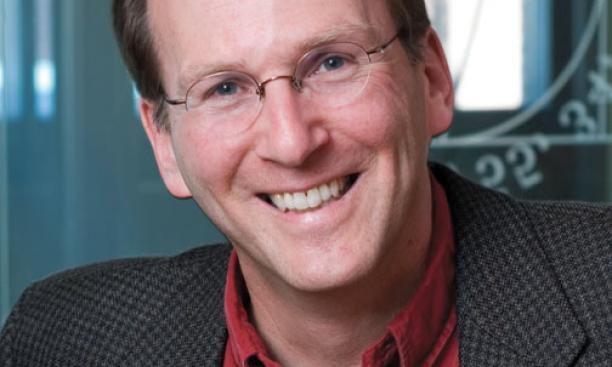

Steven Strogatz ’80, the Jacob Gould Schurman Professor of Applied Mathematics at Cornell University, takes math to the masses. Among his many awards for teaching is one from the American Mathematical Society for communicating about math to non-mathematicians, and last year he published The Calculus of Friendship, a moving account of his decades-long correspondence with his high school calculus teacher. In January he began writing a weekly math column for The New York Times Web site, at http://opinionator.blogs.nytimes. com/category/steven-strogatz/. His topics have included probability, infinity, and calculus (“the mathematics of change”). It’s not always easy reading, but Strogatz often uses video clips — Michael Jordan playing basketball or a scene from the 1980s sitcom Moonlighting, for example — to entice the less math-minded among us.
What do you hope to accomplish with your Times column?
I’m trying to reach a certain kind of reader — those like a friend of mine, who is an artist and loves science. When we get together, he wants to talk about the latest thing in evolution or quantum mechanics. But when it comes to math, he feels lost, to the extent that he doesn’t even know how to pronounce the symbols. He would like to understand what math is about, what mathematicians mean when they say that one proof is more elegant than another. It seems to me there might be other readers in that position: very smart, curious people who, for whatever reason, got left off somewhere when they tried to pick up math. Maybe they will get a big-picture view of what this great achievement of humanity is all about.
Is math phobia a worldwide phenomenon? Or is it just we Americans who have it?
From what little I know about this, it’s an American phenomenon. Different countries have different attitudes about what it takes to succeed in math. That’s been documented by the people at Johns Hopkins, at its Center for Talented Youth. When you ask a typical American parent what it takes to be good in math and give them a few choices, like hard work, natural ability, or genetics, American parents tend to say genetics or natural ability. The parents in Korea and Japan say hard work. I think that’s a big part of the explanation. There might be some gradation in innate ability — I do believe in innate ability — but I don’t think people are even coming close to reaching [their math potential] in our culture.
How might we teach math better?
It’s been suggested a lot recently that people learn well when certain lessons are cast in the form of stories. There’s something very familiar about stories — where there’s a struggle, a protagonist trying to reach a certain goal — that a lot of us understand in an intuitive way. For example, there’s the story of why imaginary numbers were invented. Instead of just giving a definition of imaginary numbers, which is the conventional way of doing it, a different approach would be to say: In 1500, mathematicians were trying to solve the cubic equation [a polynomial equation in which the highest power of the unknown is 3], and when they tried to solve that, some of the answers they were getting involved square roots of negative numbers. Even though they knew the answer should come out real, it was coming out imaginary, and they weren’t sure what to make of this. The point is that there were real people who were trying to do something, and they needed to invent some new math idea to make the breakthrough.
Did you have a “light-bulb movement,” when you realized math excited you?
Mr. Johnson was a teacher I had in my sophomore year of high school. One day, while talking about something else, he offhandedly mentioned that there was a very hard geometry problem that he had been asking students for years, and he’d never seen anyone solve it. And he himself did not know how to solve it! That made a tremendous impression on me. I started to work on it quietly. I didn’t tell anybody about it, didn’t mention it to Mr. Johnson. It was true that every time I tried something that I had been taught, it didn’t work! I found myself being consumed with it to the point where, when I was playing JV basketball and somebody would pass me the ball, it would bounce off my knee. It took about six months of steady thinking about it until I thought I had a proof. I showed it to Mr. Johnson. He sat there patiently with me, checking the steps, and said, “That’s it. You’ve done it.” He sent a little note to the headmaster saying I had real talent. It was very, very thrilling, an indelible memory for me.
— Interview conducted and condensed by Merrell Noden ’78
